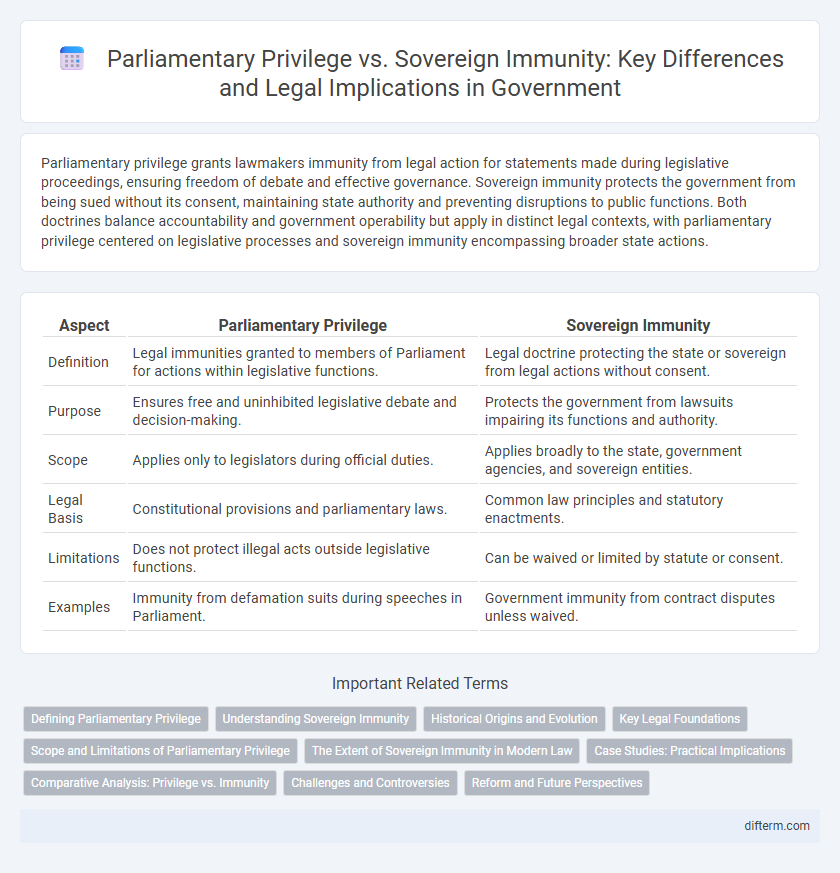Parliamentary privilege grants lawmakers immunity from legal action for statements made during legislative proceedings, ensuring freedom of debate and effective governance. Sovereign immunity protects the government from being sued without its consent, maintaining state authority and preventing disruptions to public functions. Both doctrines balance accountability and government operability but apply in distinct legal contexts, with parliamentary privilege centered on legislative processes and sovereign immunity encompassing broader state actions.
Table of Comparison
| Aspect | Parliamentary Privilege | Sovereign Immunity |
|---|---|---|
| Definition | Legal immunities granted to members of Parliament for actions within legislative functions. | Legal doctrine protecting the state or sovereign from legal actions without consent. |
| Purpose | Ensures free and uninhibited legislative debate and decision-making. | Protects the government from lawsuits impairing its functions and authority. |
| Scope | Applies only to legislators during official duties. | Applies broadly to the state, government agencies, and sovereign entities. |
| Legal Basis | Constitutional provisions and parliamentary laws. | Common law principles and statutory enactments. |
| Limitations | Does not protect illegal acts outside legislative functions. | Can be waived or limited by statute or consent. |
| Examples | Immunity from defamation suits during speeches in Parliament. | Government immunity from contract disputes unless waived. |
Defining Parliamentary Privilege
Parliamentary privilege grants members of Parliament legal immunities essential for performing their legislative functions without external interference, including freedom of speech within parliamentary debates and protection from civil or criminal liability for actions taken in the course of their duties. This privilege is fundamental to maintaining the independence and effectiveness of the legislative process. It differs from sovereign immunity, which protects the state and its agents from legal actions, focusing instead on safeguarding parliamentary proceedings and accountability.
Understanding Sovereign Immunity
Sovereign immunity protects the government from legal prosecution or lawsuits without its consent, ensuring stability and uninterrupted governance. Unlike parliamentary privilege, which safeguards legislative members during official duties, sovereign immunity applies broadly to the state and its entities, preventing courts from questioning sovereign acts. This principle balances state authority with individual rights by limiting judicial intervention in government operations.
Historical Origins and Evolution
Parliamentary privilege originated in medieval England as a means to protect legislators from external interference, ensuring freedom of speech and action within parliamentary proceedings. Sovereign immunity, rooted in the doctrine that "the king can do no wrong," evolved to shield the monarch and government from legal liability. Over centuries, both doctrines have adapted, with parliamentary privilege expanding to safeguard legislative independence and sovereign immunity becoming more nuanced to balance state accountability.
Key Legal Foundations
Parliamentary privilege is grounded in constitutional principles that protect legislators' freedom of speech and actions within parliamentary proceedings, ensuring uninhibited lawmaking and debate. Sovereign immunity, rooted in common law and statutory provisions, shields the government and its entities from legal actions without consent, preserving state functions from disruption. Both concepts arise from distinct legal foundations but share the objective of maintaining government efficacy and authority within their respective domains.
Scope and Limitations of Parliamentary Privilege
Parliamentary privilege grants legislators immunity from legal actions and outside interference to ensure independent lawmaking and robust debate, covering freedom of speech within parliamentary proceedings and protection from civil or criminal liability for actions done in the course of legislative duties. Its scope is confined to activities strictly related to parliamentary functions, excluding acts outside official duties or criminal conduct unrelated to legislative work, and it cannot override constitutional rights or judicial authority. Limitations include that privileges do not apply to defamatory statements outside parliament sessions, and parliamentary materials can be subject to judicial scrutiny if used beyond legislative purposes.
The Extent of Sovereign Immunity in Modern Law
Sovereign immunity in modern law generally protects the government from being sued without its consent, limiting legal actions against the state and its agencies. This immunity extends to many governmental functions but is often restricted by statutes and judicial exceptions allowing claims in tort or contract under specified conditions. Parliamentary privilege, distinct from sovereign immunity, safeguards legislative members from legal action concerning their official conduct, ensuring legislative independence without broadly insulating the government from judicial scrutiny.
Case Studies: Practical Implications
Parliamentary privilege protects legislators from legal action related to their official duties, as seen in the UK case of R v Chaytor, which clarified limits on immunity for fraudulent expense claims by MPs. Sovereign immunity prevents lawsuits against the state itself, demonstrated by the US Supreme Court ruling in Hans v. Louisiana, confirming that states cannot be sued without consent. These cases highlight critical practical boundaries between individual legislative protections and broader governmental immunity in enforcing accountability.
Comparative Analysis: Privilege vs. Immunity
Parliamentary privilege grants legislators legal protections such as immunity from civil or criminal liability for actions within legislative proceedings, ensuring legislative independence and effective governance. Sovereign immunity protects the state and its agents from legal suits without consent, preserving government functions from judicial interference. While privilege specifically safeguards parliamentary functions and members, immunity broadly shields the government from external legal challenges, reflecting different scopes and purposes within constitutional law.
Challenges and Controversies
Parliamentary privilege and sovereign immunity face significant challenges in balancing transparency and accountability within government. Parliamentary privilege often sparks controversy when invoked to shield lawmakers from legal scrutiny, potentially undermining democratic oversight. Sovereign immunity raises legal debates by limiting citizens' ability to hold the government accountable, prompting calls for reform to ensure justice without compromising state functions.
Reform and Future Perspectives
Reforming parliamentary privilege and sovereign immunity involves balancing the need for accountability with protecting institutional integrity, aiming to limit abuses while preserving essential governmental functions. Recent proposals emphasize clearer legal boundaries and enhanced transparency to prevent misuse of privileges without undermining legislative and executive authority. Future perspectives suggest adopting international best practices to harmonize sovereignty rights with evolving democratic standards and rule of law principles.
Parliamentary Privilege vs Sovereign Immunity Infographic

 difterm.com
difterm.com